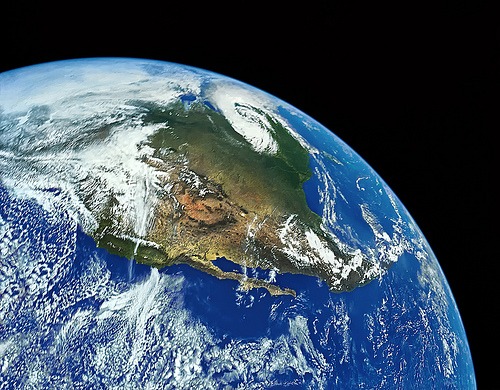Sustainable development, as that term is commonly used and understood, means making continued economic and social development more resource efficient and less detrimental to the environment. But making development more sustainable, while highly desirable, is not the same thing as actually achieving sustainability. As we plan and carry out human development programs we must ensure that our aggregated demands upon the planet’s resources do not exceed the Earth’s capacity to supply them.
The first step in achieving true sustainability is recognition of the total scale of human activity. The Global Footprint Network estimates that we are already using 150 percent of the Earth’s capacity to regenerate resources, and that does not take into account non-renewable resources, such as fossil fuels. By that measure, we are already operating unsustainably.
The next step in achieving true sustainability is acknowledging the interconnectedness of all the various subsets of sustainability. Climate change, energy, food, water, population, and the environment are all inter-related, and efforts to address one challenge often exacerbate other global challenges. We cannot solve problems in isolation. We must be mindful of the inevitable trade-offs.
The third and crucial step is recognizing that our failure to balance human demands with the capacity of the Earth has serious consequences for people today, not just future generations. Extreme weather patterns and soaring food prices are products of an over-heated, over-subscribed planet, and they are a sign that much worse is to come unless we reduce the total scale of human activity.
We believe that the greatest challenge facing humanity today is that we are simply demanding too much from the planet. Humanity must collectively recognize and fully acknowledge that our species is already over-utilizing the finite resources of planet earth and reduce the total scale of the human endeavor in an urgent, orderly, and equitable manner. An overwhelming body of scientific evidence and repeated warnings from global studies and reports from high level commissions inform us that we have already exceeded the sustainable carrying capacity of the planet and that we are putting resource systems (and future human development) at great risk[1]. We must wake up to this reality. The total quantity of natural resource goods and services that our species takes from the planet each year must be down-sized, and we must plan future withdrawals in a more responsible manner. Our future resource demands must be brought into balance with the sustainable capacity of planetary systems.
It is time to recognize that our species has simply grown too big for one planet and that we must adopt a new political and social paradigm: one that calls for reducing and adapting ourselves to fit within the means of nature rather than pursuing our constant struggle to adapt nature and exploit resources on an ever-increasing scale. We’ve gone beyond the safety regime for such activity. We must shift our development focus from ‘building more for humanity’ to ‘adapting and sizing ourselves to fit the planet.’ Human development and sustainable well-being will now be better served in the context of this latter paradigm: sizing our societal and economic activities to fit within the resource limitations of each local, regional, national, and global ecosystem. With the global reality of total resource overshoot already upon us, it’s the only reasonable policy option to pursue.[2]
[1] This risk is often framed as something that may occur in the future (e.g. paragraph 42 of the Report to the Secretary-General by the UN System Task Team on the Post-2015 UN Development Agenda; “Realizing the Future We Want for All”). This future-tense framing is politically more palatable but factually absurd. It only serves to stall important policy efforts that are urgently needed for achieving future sustainability on a planet with finite resources.
[2] For more information please contact the Sustainable World Initiative, 107 Second Street NE, Washington DC, 20002, or access further information via our website: www.swinitiative.com
– From the Sustainable World Initiative: Research, education, and policy guidance for a better global future
MAHB-UTS Blogs are a joint venture between the University of Technology Sydney and the Millennium Alliance for Humanity and the Biosphere. Questions should be directed to joan@mahbonline.org
MAHB Blog: https://mahb.stanford.edu/blog/the-challenge-for-humanity/

